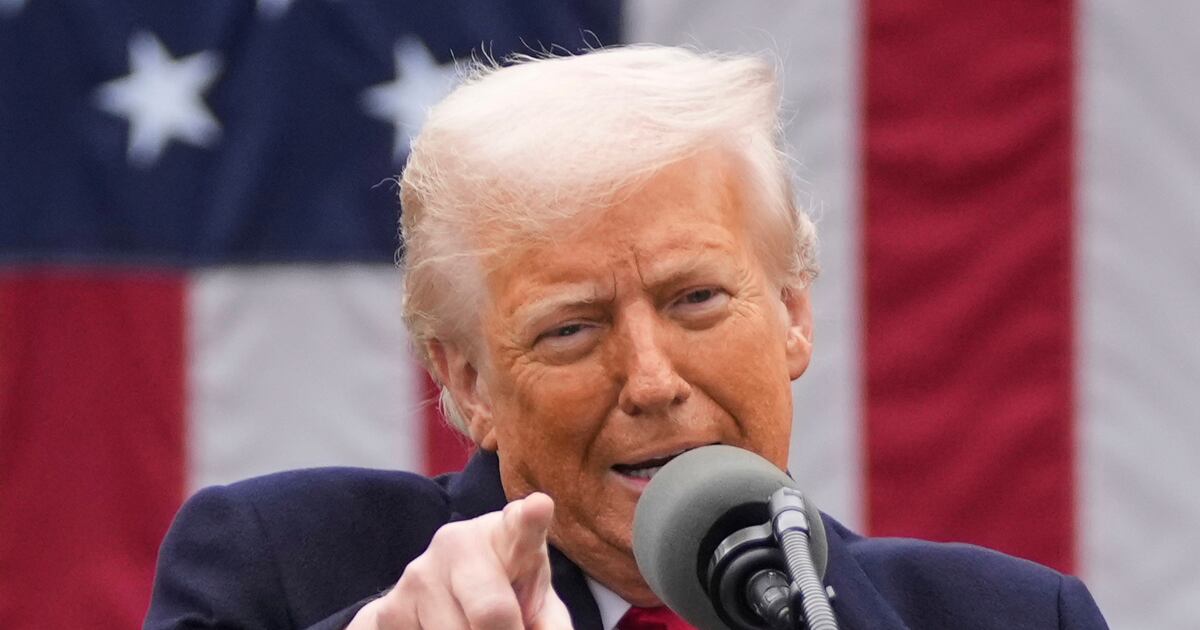President Donald Trump may be the only person standing between Iran, Israel and an apocalyptic war of biblical proportions. At the outset of such a war, strikes on nuclear facilities would expose entire populations to toxic chemical plumes and radioactive materials. Nuclear disasters know no boundaries: think Chernobyl and Fukushima on steroids.
At a press conference in late May, President Trump confirmed rumors that he called on Israeli Prime Minister Benjamin Netanyahu to delay military strikes against Iran. Citing progress in the nuclear negotiations, he characterized strikes at this juncture as “very inappropriate.”
No one can claim that Trump’s resistance to war and his moral revulsion at bloodshed lack a foundation in fact, faith, reason or history. As he told Esquire magazine in August 2004, a year after the Iraq invasion:
“What was the purpose of this whole thing? Hundreds and hundreds of young people killed. And what about the people coming back with no arms and legs? Not to mention the other side. All those Iraqi kids who’ve been blown to pieces. And it turns out that all of the reasons for the war were blatantly wrong. All this for nothing!”
A similar antipathy for war is evident in Trump’s approach to a nuclear deal with Iran. While not opposed to strikes as a last resort, Trump told reporters that he prefers an agreement that includes a rigorous verification regime to prevent Tehran from acquiring a bomb.
“I want it [to be a] very strong agreement where we can go in with inspectors, we can take whatever we want, we can blow up whatever we want, but nobody getting killed. We can blow up a lab, but nobody is gonna be in a lab, as opposed to everybody being in the lab and blowing it up.”
If only the leaders of Iran and Israel were as concerned as Trump about the costs and precedents set by strikes on nuclear sites.
In “The Ayatollah’s Nuclear Gamble: The Human Cost of Military Strikes,” a study published by Omid for Iran and the Hinckley Institute, Iran’s Supreme Leader, Ayatollah Ali Khamenei, was warned about the human cost of his nuclear gamble. Based on the available information, the study estimated that between 7,000 and 11,000 people — scientists, workers, soldiers and staff — at Iran’s nuclear facilities would be killed or injured immediately. If only 5% of the 371 metric tons of uranium hexafluoride held at the Isfahan facility were to become airborne, with prevailing winds at 9.4 miles per hour, a toxic plume could expose approximately 240,000 residents in Isfahan alone within an hour. It concluded that “the contamination of air, water, and soil from the thermal impact of strikes on nuclear plants would be immediate, vast, and, for the most part, irreversible.”
The regional effects would be catastrophic. Qatari Prime Minister Sheikh Mohammed told journalist Tucker Carlson that strikes on the Bushehr nuclear plant would render the sea “entirely contaminated” and put all Gulf countries at risk: “No water, no fish … nothing. No life!” he warned.
Israel is also at risk. In December 2021, the Jerusalem Post reported that the Islamic Republic claimed to have successfully simulated “attacks on the Dimona nuclear plant using 16 ballistic missiles and five suicide drones.”
Bemoaning the specter of “the first radiological war in history,” Bennet Ramberg, a former State Department official, likened the effects of a successful strike on the Dimona reactor to “a substantial radiological weapon or dirty bomb.” In his seminal study, he noted that “the relative economic dislocation, population relocation, and immediate and lingering psychological trauma could be significant.”
In a major address in Riyadh, Saudi Arabia, on May 13, 2025, President Trump offered Iran, Israel and the other players in the region an exit ramp. He lamented the disastrous Western interventions in Afghanistan and Iraq — the hubris of neo-cons and nation-builders — promising an era of peace and prosperity rooted in pragmatism and profit:
“Before our eyes, a new generation of leaders is transcending the ancient conflicts and tired division of the past, and forging a future where the Middle East is defined by commerce, not chaos; where it exports technology, not terrorism; and where people of different nations, religions and creeds are building cities together — not bombing each other out of existence.”
President Trump may never win the Nobel Peace Prize. However, he has captured the imagination of Iranians and Israelis who want an end to the region’s wars. Rather than rushing into a war, Iranians, held hostage by a cult of death and martyrdom, want Trump to prioritize peace and prosperity. With a national trucker strike spreading across 150 cities in Iran, the Iranian people would say yes to a broader Iran deal that would enable them to reclaim their stolen sovereignty, security, democracy and dignity.
As Secretary of State Marco Rubio has repeated time and time again, the Iranian people are our friends and partners. They are the ones who hold the keys to regional peace and stability that can save the lives of innocent Israelis and Palestinians, not the radical Shi’a clerics who seek war and destruction.
